
Journal of Cotton Research
Scope & Guideline
Fostering Collaboration in Cotton Research
Introduction
Aims and Scopes
- Genetic Improvement of Cotton:
Research on the genetic enhancement of cotton species, focusing on traits such as fiber quality, drought tolerance, and pest resistance through genetic mapping and QTL analysis. - Agronomic Practices and Environmental Adaptation:
Studies exploring optimal agronomic practices, including planting systems, irrigation strategies, and intercropping systems that enhance cotton growth and resilience to environmental stresses. - Pest Management and Resistance Mechanisms:
Investigations into pest management strategies, including the development of pest-resistant cotton varieties and the ecological impact of genetically modified cotton. - Biochemical and Physiological Studies:
Research into the biochemical pathways and physiological responses of cotton plants under stress conditions, including drought, salinity, and pest attacks. - Technological Innovations in Cotton Production:
Application of advanced technologies, including multiomics approaches, imaging techniques, and machine learning, to improve cotton production and fiber quality.
Trending and Emerging
- Multiomics Approaches:
The integration of genomics, transcriptomics, proteomics, and metabolomics is increasingly used to explore complex traits in cotton, particularly in relation to stress tolerance and fiber quality. - Sustainable Agricultural Practices:
Research is trending towards sustainable practices, including the use of biostimulants and environmentally friendly pest control methods, which aim to reduce the ecological footprint of cotton farming. - Genetic Engineering and CRISPR Technology:
The application of CRISPR and other genome editing technologies is emerging as a key theme for developing cotton varieties with enhanced traits, such as pest resistance and abiotic stress tolerance. - Impact of Climate Change on Cotton Production:
Studies are increasingly focusing on how climate change affects cotton yield and quality, driving research into adaptive strategies and resilient cotton varieties. - Advanced Imaging and Detection Technologies:
The use of techniques such as hyperspectral imaging and machine learning for non-destructive testing of cotton quality is gaining traction, indicating a shift towards precision agriculture.
Declining or Waning
- Traditional Pest Control Methods:
Research on conventional pest control methods has decreased as interest shifts towards integrated pest management and the use of genetically modified organisms (GMOs) that inherently possess pest resistance. - Basic Morphological Studies:
While foundational studies on cotton morphology were prevalent in earlier publications, recent trends indicate a decline in this area as researchers focus more on genetic and molecular studies that offer deeper insights into cotton development. - Historical Reviews of Cotton Breeding:
Although historical perspectives on cotton breeding provided important context, there has been a noticeable decrease in such reviews as the journal emphasizes new findings and innovative approaches to breeding.
Similar Journals

Journal of Cotton Science
Empowering the Cotton Community Through ResearchJournal of Cotton Science is a vital publication dedicated to advancing the understanding and innovative practices within the cotton industry. Published by the NATIONAL COTTON COUNCIL OF AMERICA, this journal has been a key resource for researchers, agronomists, and industry professionals since its inception in 1997, with contributions spanning various aspects of cotton science, including breeding, genetics, pest management, and environmental impact. With an ISSN of 1523-6919 and an E-ISSN of 1524-3303, it currently holds a Q3 ranking in the Materials Science (miscellaneous) category as per the 2023 quartiles. While the journal operates without open access, it remains accessible to professionals looking to contribute to its expanding reach. The Journal of Cotton Science plays a pivotal role in disseminating cutting-edge research and fostering collaboration among scientists, positioning itself as an essential resource in the ongoing exploration of cotton's material science applications. Stay up to date with the latest findings and developments that shape the future of this crucial agricultural product.

Revista de la Facultad de Agronomia de la Universidad del Zulia
Fostering Dialogue: Connecting Ideas in Agronomy and BeyondWelcome to the Revista de la Facultad de Agronomia de la Universidad del Zulia, a key publication in the fields of Agronomy, Animal Science, Food Science, and Plant Science. Published by the Facultad de Agronomía, Universidad del Zulia, this journal aims to foster academic dialogue and disseminate impactful research that advances knowledge and practice within these disciplines. Operating under the ISSN 0378-7818 and E-ISSN 2477-9407, this journal offers a platform for both emerging and established scholars to share their discoveries and innovations. Despite its challenges, as reflected in its Q4 ranking across multiple categories in 2023, it remains a vital resource for the Venezuelan scientific community and beyond. Readers will benefit from a diverse array of studies and discussions that address contemporary issues in agriculture and related fields, helping inform best practices and policy. Engage with cutting-edge research from Venezuela and contribute to the development of agronomic sciences in the region.
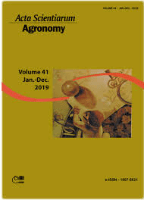
ACTA SCIENTIARUM-AGRONOMY
Unlocking the potential of agriculture through open access.ACTA SCIENTIARUM-AGRONOMY is a prestigious, peer-reviewed journal published by UNIV ESTADUAL MARINGA, PRO-REITORIA PESQUISA POS-GRADUACAO, focusing on advanced research in the field of agronomy and crop science. Since its inception as an Open Access journal in 2007, it has significantly contributed to disseminating high-quality research, allowing unrestricted access to its content for a global audience. Operating from Brazil, the journal holds a notable Q2 category ranking in Agronomy and Crop Science as of 2023, validating its importance within the academic community. The journal’s Scopus ranking positions it in the 49th percentile among Agricultural and Biological Sciences, indicating a robust foundation for impactful research. With a commitment to innovation and scientific excellence, ACTA SCIENTIARUM-AGRONOMY aims to provide researchers, professionals, and students with vital insights that drive forward our understanding of agriculture and its environmental implications.

Romanian Agricultural Research
Elevating Agricultural Insights for Tomorrow's ChallengesRomanian Agricultural Research is a prominent academic journal dedicated to advancing the field of agricultural science with a specific focus on agronomy and crop management. Published by the NATL AGRICULTURAL RESEARCH & DEVELOPMENT INST in Romania, this journal has established itself as an important resource within its discipline, evidenced by its Q3 ranking in the Agronomy and Crop Science category for 2023. With its ongoing publication since 2008, the journal provides a platform for researchers and professionals to disseminate their findings and share innovative practices that address the challenges faced in agricultural development. Although it operates under a non-open access model, Romanian Agricultural Research commits to rigorous peer-review processes, ensuring the high-quality content that enhances the academic community’s knowledge base. The journal's objective is to foster dialogues surrounding sustainable agriculture, improve crop yield, and contribute to the enhancement of agricultural practices globally. Researchers, professionals, and students will find this journal to be an invaluable repository of knowledge and a catalyst for future agricultural innovations.

JOURNAL OF GENETICS
Illuminating Genetic Discoveries for a Global CommunityJOURNAL OF GENETICS, published by the Indian Academy of Sciences, is a pivotal platform for researchers and scholars in the field of genetics. With its long-standing history dating back to 1910, this journal has consistently contributed to the academic discourse through the rigorous publication of original research, reviews, and case studies. Despite its current classification in the Q4 quartile for the 2023 metrics in Genetics, the journal plays a critical role in advancing our understanding of genetic principles, experimental methodologies, and innovations. Spanning a diverse array of topics, the journal aims to foster scholarly exchange and collaboration within the global genetics community. For researchers aiming to publish their work, accessing the journal’s comprehensive archives, which include publications from as early as 1910 to the present day, offers a valuable perspective on the evolution of genetic research. As it continues to adapt to the changing landscape of scientific inquiry, JOURNAL OF GENETICS remains a significant resource for students, professionals, and academics dedicated to exploring the complexities of genetics.
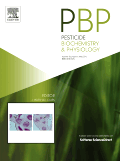
Pesticide Biochemistry and Physiology
Championing high-quality research for food security and environmental safety.Pesticide Biochemistry and Physiology, published by Academic Press Inc Elsevier Science, is a prominent peer-reviewed journal dedicated to advancing knowledge in the fields of agronomy, crop science, and the toxicological effects of pesticides. With an established history since 1971, this journal aims to provide a platform for researchers and professionals to share groundbreaking studies that bridge the gap between agricultural practices and environmental health. Holding a remarkable Q1 ranking in both Agronomy and Crop Science as well as Health, Toxicology, and Mutagenesis, it reflects the journal's commitment to high-quality research. The journal is essential reading for anyone involved in the sustainability of agricultural ecosystems, offering insights into the biochemical interactions of pesticides and their physiological impacts on various crops and non-target organisms. As the global demand for sustainable agricultural practices escalates, Pesticide Biochemistry and Physiology remains at the forefront, promoting innovative research to ensure both food security and environmental safety. Converged through an extensive range of studies, this journal is a valuable resource for researchers, professionals, and students aiming to make significant contributions to the evolving landscape of pesticide biochemistry.
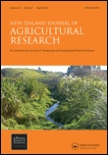
NEW ZEALAND JOURNAL OF AGRICULTURAL RESEARCH
Advancing Agricultural Science for a Sustainable FutureNEW ZEALAND JOURNAL OF AGRICULTURAL RESEARCH is a prestigious, peer-reviewed journal published by Taylor & Francis Ltd that has been at the forefront of agricultural science since its inception in 1958. With a strong focus on the fields of Agronomy and Crop Science, Animal Science and Zoology, Plant Science, and Soil Science, this journal has established itself in the academic community, achieving a notable Q2 ranking in various agricultural categories as of 2023. The journal thrives on its commitment to disseminating cutting-edge research and innovative practices that address contemporary challenges in agriculture. Although it does not currently offer an open access option, its valuable contributions can be accessed through various academic platforms, ensuring that vital research reaches a wide audience of researchers, professionals, and students globally. The journal's continued relevance and authority are reflected in its strong Scopus rankings, further emphasizing its role as a critical journal within the agricultural sciences.
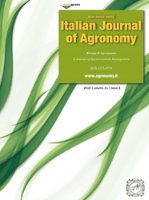
Italian Journal of Agronomy
Fostering collaboration in the world of agronomy and crop science.The Italian Journal of Agronomy is a prestigious, peer-reviewed outlet dedicated to advancing research and scholarship in the field of agronomy and crop science. Published by PAGEPRESS PUBL in Italy, this journal is committed to providing a platform for the dissemination of high-quality research since achieving its Open Access status in 2006. With an ISSN of 1125-4718 and an E-ISSN of 2039-6805, it is recognized for its contribution to the scientific community, boasting a commendable Q2 category ranking in Agronomy and Crop Science as of 2023. The journal's impressive Scopus ranking places it in the 75th percentile within General Agricultural and Biological Sciences and the 69th percentile in Agronomy and Crop Science, reflecting its significant impact and relevance. Covering a wide range of topics relevant to agriculture, from sustainability practices to innovative farming techniques, the Italian Journal of Agronomy serves as an essential resource for researchers, professionals, and students seeking to enrich their knowledge and contribute to the advancement of the agricultural sciences.
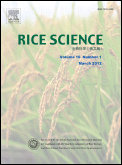
Rice Science
Pioneering Discoveries in Plant ScienceRice Science is an esteemed open-access journal published by Elsevier that has been a pivotal source of insight for researchers in the fields of Agronomy, Biotechnology, and Plant Science. With an impressive impact factor, it stands out in the Q1 category of its respective fields, showcasing its commitment to high-quality research and significant contributions to the advancement of rice science. Covering a broad spectrum of topics, from genetic advancements to sustainable agricultural practices, Rice Science facilitates the dissemination of timely and critical research findings to a global audience, making it an invaluable resource for academics, professionals, and students alike. As the journal continues to publish influential work through 2024 and beyond, it remains at the forefront of agricultural innovation and plant research, empowering stakeholders to enhance rice production and food security worldwide.

Turkish Journal of Field Crops
Transforming Agriculture Through Cutting-Edge ResearchTurkish Journal of Field Crops is a prestigious peer-reviewed publication dedicated to advancing the field of agronomy and crop science, published by the Society of Field Crop Science. With an ISSN of 1301-1111, this journal serves as a crucial platform for researchers and professionals to disseminate innovative findings and discuss practical applications in crop cultivation and management. Hailing from Turkey, it aims to address the pressing challenges facing agriculture in both regional and global contexts, particularly over its converged years from 2009 to 2024. As a Q3 ranked journal in the Agronomy and Crop Science category with a Scopus ranking of #259/406 and a percentile of 36th, it fosters high-quality research that contributes to the sustainable development of field crops. Though it operates under various access options, this journal is committed to providing valuable insights into agronomic practices, aiming to bridge the gap between theory and application for scientists, educators, and practitioners alike.